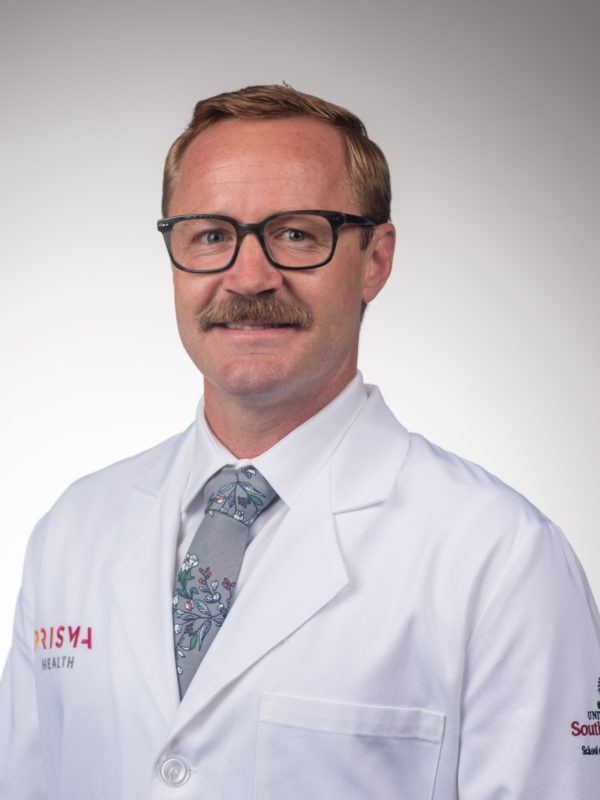Can GERD be cured?
While occasional acid reflux isn’t uncommon, it can be uncomfortable or even painful and make it difficult to enjoy your favorite foods. When stomach acid repeatedly moves into the esophagus (which connects your mouth and stomach), it’s known as gastroesophageal reflux disease, commonly called GERD.
Brian David Hodgens, MD, answered some commonly asked questions about GERD, including treatments for acid reflux disease and if GERD can be cured.
What causes acid reflux or GERD to develop?
“In short, acid reflux is possible when there’s a problem with the barrier between the esophagus and the stomach,” said Dr. Hodgens.
This could involve eating a very large meal – acid reflux is a common ‘extra side dish’ at Thanksgiving and Christmas dinner, after all – or eating very fatty or fried foods. This may also be worsened with positional changes such as bending over and laying down at night. Some people are more prone to developing the condition than others based on genetics and other health issues. In some cases, infants may struggle with GERD even while on breastmilk or formula and need specialized nutrition to settle their stomachs.
Risk factors for developing GERD include:
- Being overweight or obese
- Pregnancy
- Connective tissue conditions like lupus or rheumatoid arthritis
- Smoking
- Large meals or meals which include fatty or fried foods
- Consuming large amounts of coffee or alcohol
- Continued use of aspirin
- Eating just before bed
- Hiatal hernia
- Any condition that causes delayed emptying of the stomach
Can GERD be cured?
“Depending on the cause, reflux disease may get better without medical intervention,” said Dr. Hodgens. “Certain changes to diet and lifestyle, weight loss and quitting trigger foods or smoking can reduce symptoms by quite a bit, as can the use of medication.”
For acid reflux caused by a hiatal hernia, losing weight, diaphragmatic breathing and changing eating habits can keep the hernia from growing larger over time and help delay more severe symptoms.
Only endoscopic or surgical therapy can actually ‘fix’ GERD when it is due to anatomic abnormalities.
Is treating acid reflux with medication effective?
“The medications we use to treat GERD are incredibly effective at reducing acidity in the stomach, which helps painful and uncomfortable symptoms like heartburn and chest pain. They can also help patients avoid the development of ulcers,” said Dr. Hodgens. “That said, there are some concerns about side effects, especially with long-term medication therapy for acid reflux.”
Dr. Hodgens emphasized that the studies showing a potential link between long-term acid reflux medication use and issues like bone density problems, kidney or pulmonary function issues or GI infections aren’t set in stone. Medications can help people struggling with acid reflux get back to comfortably living their lives.
Does everyone with GERD eventually need surgery?
“Not necessarily! Surgery is meant to improve your quality of life, and if you are satisfied with your life while utilizing medication therapy for GERD, then medication may be the preferred treatment route for you,” said Dr. Hodgens. “I believe in educating patients on all the options out there, then having a frank and honest discussion on the risks and benefits of all the treatment methods.”
In some patients with certain characteristics of the disease, surgery is more strongly recommended, but in others medication may be enough to return you to your previous quality of life.
Can GERD come back even after treatment?
“Unfortunately, it is possible for both medicine and surgery to fail, which would lead symptoms to return,” said Dr. Hodgens. “In that case, more intervention may be required. Primarily, though, my patients have told me that their lives improved drastically and that they wish they’d made the decision a decade sooner rather than waiting so long.”
Does GERD run in the family?
“There does seem to be a genetic component to both reflux disease and to the hiatal hernias that can sometimes cause it,” said Dr. Hodgens. “It doesn’t mean you will definitely get it, but we do frequently work with patients who have other members of their family dealing with the same issues.”
If you have a family history of GERD, hiatal hernias or even just recall family members having lots of problems with heartburn or chest pain after big meals or when eating certain foods, make sure to mention it to your family doctor during your annual checkup.
Find a doctor
Whether you’re looking for a primary care physician or need to see a specialist, we’re here to help with experienced, compassionate care near you.
Find a Doctor

